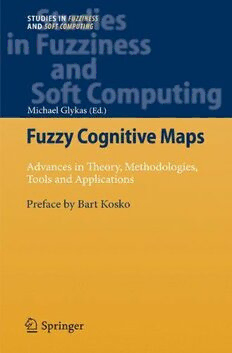Download Fuzzy Cognitive Maps: Advances in Theory, Methodologies, Tools and Applications PDF Free - Full Version
Download Fuzzy Cognitive Maps: Advances in Theory, Methodologies, Tools and Applications by Peter P. Groumpos (auth.), Michael Glykas (eds.) in PDF format completely FREE. No registration required, no payment needed. Get instant access to this valuable resource on PDFdrive.to!
About Fuzzy Cognitive Maps: Advances in Theory, Methodologies, Tools and Applications
The theory of cognitive maps was developed in 1976. Its main aim was the representation of (causal) relationships among “concepts” also known as “factors” or “nodes”. Concepts could be assigned values. Causal relationships between two concepts could be of three types: positive, negative or neutral. Increase in the value of a concept would yield a corresponding positive or negative increase at the concepts connected to it via relationships. In 1986 Bart Kosko introduced the notion of fuzziness to cognitive maps and created the theory of Fuzzy Cognitive Maps (FCMs). The relationship between two concepts in (FCMs) can take a value in the interval [-1,1]. This relationship value is called “weight”. For the last twenty years extensive research in the theory of FCMs has been performed that provided major improvements and enhancements in its theoretical underpinning. New methodologies and approaches have been developed. FCMs have also been applied to many different sectors. New software tools have been developed that automate FCM creation and management. The aim of this book is to present recent advances and state of the art in FCM theory, methodologies, applications and tools that exist to date scattered in journal papers, in a concrete and integrated manner.
Detailed Information
| Author: | Peter P. Groumpos (auth.), Michael Glykas (eds.) |
|---|---|
| Publication Year: | 2010 |
| ISBN: | 9783642032202 |
| Pages: | 435 |
| Language: | English |
| File Size: | 8.694 |
| Format: | |
| Price: | FREE |
Safe & Secure Download - No registration required
Why Choose PDFdrive for Your Free Fuzzy Cognitive Maps: Advances in Theory, Methodologies, Tools and Applications Download?
- 100% Free: No hidden fees or subscriptions required for one book every day.
- No Registration: Immediate access is available without creating accounts for one book every day.
- Safe and Secure: Clean downloads without malware or viruses
- Multiple Formats: PDF, MOBI, Mpub,... optimized for all devices
- Educational Resource: Supporting knowledge sharing and learning
Frequently Asked Questions
Is it really free to download Fuzzy Cognitive Maps: Advances in Theory, Methodologies, Tools and Applications PDF?
Yes, on https://PDFdrive.to you can download Fuzzy Cognitive Maps: Advances in Theory, Methodologies, Tools and Applications by Peter P. Groumpos (auth.), Michael Glykas (eds.) completely free. We don't require any payment, subscription, or registration to access this PDF file. For 3 books every day.
How can I read Fuzzy Cognitive Maps: Advances in Theory, Methodologies, Tools and Applications on my mobile device?
After downloading Fuzzy Cognitive Maps: Advances in Theory, Methodologies, Tools and Applications PDF, you can open it with any PDF reader app on your phone or tablet. We recommend using Adobe Acrobat Reader, Apple Books, or Google Play Books for the best reading experience.
Is this the full version of Fuzzy Cognitive Maps: Advances in Theory, Methodologies, Tools and Applications?
Yes, this is the complete PDF version of Fuzzy Cognitive Maps: Advances in Theory, Methodologies, Tools and Applications by Peter P. Groumpos (auth.), Michael Glykas (eds.). You will be able to read the entire content as in the printed version without missing any pages.
Is it legal to download Fuzzy Cognitive Maps: Advances in Theory, Methodologies, Tools and Applications PDF for free?
https://PDFdrive.to provides links to free educational resources available online. We do not store any files on our servers. Please be aware of copyright laws in your country before downloading.
The materials shared are intended for research, educational, and personal use in accordance with fair use principles.

